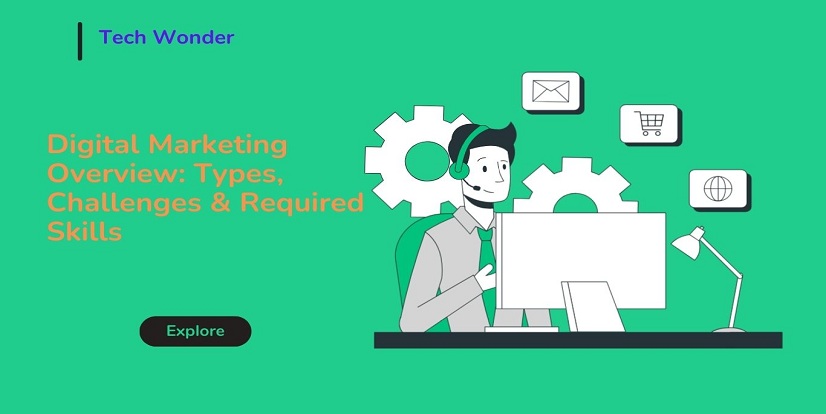Discover Digital Marketing, including different types, challenges, and skills needed. From social media to SEO, understand the varied aspects of digital marketing. Learn about the hurdles and the skills necessary for success in this dynamic and always-changing field.
What Is Digital Marketing?
Marketing is using the internet to advertise and sell things. It involves strategies like social media marketing, SEO, and emails. Unlike old-style marketing, digital marketing uses online platforms to reach a big audience, measure how well things are working, and talk to customers quickly.
It includes lots of ways to make people know a brand, get more visitors to a website, and create potential customers. In today’s digital world, businesses need digital marketing to connect with people and succeed online.
What Are The Challenges Of Digital Marketing?
- Adapting to Algorithms: Keeping up with changes in search engines and social media rules.
- Building Trust: Maintaining consumer trust amidst concerns about data privacy.
- Content Saturation: Navigating through the overload of information online.
- Privacy Regulations: Balancing the desire for personalised experiences with privacy laws.
- Technological Advancements: Staying updated with new technologies shaping the digital landscape.
- Proving ROI: Demonstrating the value and return on investment of digital marketing efforts.
- Continuous Learning: The fast-paced nature demands constant learning and adaptation.
- Authentic Connection: Prioritising genuine relationships with the audience amidst digital noise.
Which Skills Are Required For Digital Marketing?
- SEO and SEM Skills: Know how to make websites show up on search engines and use paid ads effectively.
- Social Media Management: Create and handle content on platforms like Facebook and Instagram.
- Content Marketing: Write interesting and relevant content for various online channels.
- Data Analysis: Use tools like Google Analytics to understand data and make smart decisions.
- Email Marketing: Create emails that people want to read and engage with.
- Graphic Design: Have basic design skills for making things look good online.
- Video Production: Make and edit videos for different online platforms.
- Copywriting: Write words that persuade and interest people for ads and websites.
- Ad Campaign Management: Understand and control online advertising campaigns.
- Social Listening: Pay attention to what people are saying online to understand their feelings.
Having these skills helps digital marketers do their job well in the constantly changing world of digital marketing.
What Are Digital Skills?
Digital skills are important in today’s digital world. It means being good at using online tools, understanding how the internet works, and communicating online. Key skills include knowing how to code, design graphics, analyse data, and manage social media.
Being aware of cybersecurity, understanding e-commerce, and being adaptable to new technologies are also crucial. These skills empower people to do things online, like creating content and staying safe.
Having good digital skills is important for success in both work and personal life in our modern, digital age.
What Are The Benefits Of Digital Marketing?
- Cost-Effectiveness: Digital marketing is more budget-friendly than traditional methods, making it accessible to businesses of all sizes.
- Precise Targeting: It allows businesses to target specific audiences, ensuring that marketing efforts reach the right people.
- Real-time Analytics: Immediate access to analytics helps businesses measure campaign success and make quick adjustments.
- Higher Engagement: Social media and interactive content increase engagement, fostering stronger connections with customers.
- Brand Visibility: Establishing a strong online presence enhances brand visibility in a world increasingly reliant on digital interactions.
- Businesses: may access a worldwide audience, overcoming regional limitations.
- Flexibility: Digital marketing offers flexibility, allowing businesses to adapt and modify strategies swiftly based on real-time performance, ensuring a dynamic and responsive approach to marketing efforts.
How To Learn Digital Marketing?
- Online Courses: Take marketing courses on platforms like Coursera or Udemy.
- Certifications: Get certified by Google (Google Analytics, Google Ads) and HubSpot.
- Blogs and Websites: Read marketing blogs for insights and updates.
- Practical Experience: Gain hands-on experience through internships or freelance work.
- Networking: Join marketing communities on social media to connect with professionals.
- Books: Read marketing books by industry experts for deeper knowledge.
- Stay Updated: Keep current with industry trends through webinars, podcasts, and online forums.
Conclusion
Learning digital marketing involves online courses, certifications, practical experience, networking, reading, and staying updated. It’s an ongoing journey of education and hands-on practice, adapting to the dynamic nature of the field. Engaging with the digital marketing community ensures a well-rounded understanding for success in this evolving domain.
